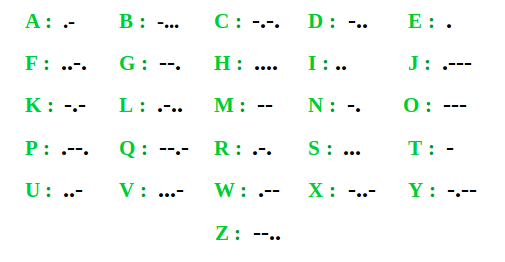给定一个字符串数组arr[] ,任务是通过用摩尔斯电码替换字符串的每个字符来计算可以从给定数组生成的不同字符串的数量。以下是所有小写字母的摩尔斯电码:

例子:
Input: arr[] = {“gig”, “zeg”, “gin”, “msn”}
Output: 2
Explanation:
Replacing each character of the strings of the given array to its Morse code:
gig = “–…–.”
zeg = “–…–.”
gin = “–…-.”
msn = “–…-.”
Morse code of the strings “gig” and “zeg” are equal.
Morse code of the strings “gin” and “msn” are equal.
Therefore, the total count of distinct elements of the given string by replacing the characters to its Morse code is equal to 2.
Input: arr[] = {“geeks”, “for”, “geeks”}
Output: 2
处理方法:按照以下步骤解决问题:
- 初始化一个数组,比如说morseCode[]来存储所有小写字符的莫尔斯电码。
- 创建一个集合,比如st ,通过将每个字符替换为其莫尔斯电码来存储数组的不同元素。
- 遍历数组并将数组字符串的莫尔斯电码插入到st 中。
- 最后,打印st 中存在的元素计数。
下面是上述方法的实现。
C++
// C++ program to implement
// the above approach
#include
using namespace std;
// Function to count unique array elements
// by replacing each character by its Morse code
int uniqueMorseRep(vector& arr)
{
// Stores Morse code of all
// lowercase characters
vector morseCode
= {
".-", "-...", "-.-.",
"-..", ".", "..-.", "--.",
"....", "..", ".---", "-.-",
".-..", "--", "-.", "---",
".--.", "--.-", ".-.", "...",
"-", "..-", "...-", ".--",
"-..-", "-.--", "--.."
};
// Stores distinct elements of string by
// replacing each character by Morse code
set st;
// Stores length of arr[] array
int N = arr.size();
// Traverse the array
for (int i = 0; i < N; i++) {
// Stores the Morse code
// of arr[i]
string temp = "";
// Stores length of
// current string
int M = arr[i].length();
for (int j = 0; j < M; j++) {
// Update temp
temp += morseCode[arr[i][j] - 'a'];
}
// Insert temp into st
st.insert(temp);
}
// Return count of elements
// in the set
return st.size();
}
// Driver code
int main()
{
vector arr = { "gig", "zeg",
"gin", "msn" };
cout << uniqueMorseRep(arr) << endl;
} Java
// Java program to implement
// the above approach
import java.util.*;
class GFG{
// Function to count unique
// array elements by replacing
// each character by its Morse code
static int uniqueMorseRep(String[] arr)
{
// Stores Morse code of all
// lowercase characters
String []morseCode = {".-", "-...", "-.-.",
"-..", ".", "..-.", "--.",
"....", "..", ".---", "-.-",
".-..", "--", "-.", "---",
".--.", "--.-", ".-.", "...",
"-", "..-", "...-", ".--",
"-..-", "-.--", "--.."};
// Stores distinct elements of
// String by replacing each
// character by Morse code
HashSet st = new HashSet<>();
// Stores length of arr[] array
int N = arr.length;
// Traverse the array
for (int i = 0; i < N; i++)
{
// Stores the Morse code
// of arr[i]
String temp = "";
// Stores length of
// current String
int M = arr[i].length();
for (int j = 0; j < M; j++)
{
// Update temp
temp += morseCode[arr[i].charAt(j) - 'a'];
}
// Insert temp into st
st.add(temp);
}
// Return count of elements
// in the set
return st.size();
}
// Driver code
public static void main(String[] args)
{
String[] arr = {"gig", "zeg",
"gin", "msn"};
System.out.print(uniqueMorseRep(arr) + "\n");
}
}
// This code is contributed by Amit Katiyar Python3
# Python3 program to implement
# the above approach
# Function to count unique
# array elements by replacing
# each character by its Morse
# code
def uniqueMorseRep(arr):
# Stores Morse code of
# all lowercase characters
morseCode = [".-", "-...", "-.-.",
"-..", ".", "..-.",
"--.", "....", "..",
".---", "-.-", ".-..",
"--", "-.", "---", ".--.",
"--.-", ".-.", "...", "-",
"..-", "...-", ".--", "-..-",
"-.--", "--.."];
# Stores distinct elements of
# String by replacing each
# character by Morse code
st = set();
# Stores length of arr array
N = len(arr);
# Traverse the array
for i in range(N):
# Stores the Morse code
# of arr[i]
temp = "";
# Stores length of
# current String
M = len(arr[i]);
for j in range(M):
# Update temp
temp += morseCode[ord(arr[i][j]) -
ord('a')];
# Insert temp into st
st.add(temp);
# Return count of elements
# in the set
return len(st);
# Driver code
if __name__ == '__main__':
arr = ["gig", "zeg",
"gin", "msn"];
print(uniqueMorseRep(arr) , "");
# This code is contributed by 29AjayKumarC#
// C# program to implement
// the above approach
using System;
using System.Collections.Generic;
class GFG{
// Function to count unique
// array elements by replacing
// each character by its Morse code
static int uniqueMorseRep(String[] arr)
{
// Stores Morse code of all
// lowercase characters
String []morseCode = {".-", "-...", "-.-.",
"-..", ".", "..-.", "--.",
"....", "..", ".---", "-.-",
".-..", "--", "-.", "---",
".--.", "--.-", ".-.", "...",
"-", "..-", "...-", ".--",
"-..-", "-.--", "--.."};
// Stores distinct elements of
// String by replacing each
// character by Morse code
HashSet st = new HashSet();
// Stores length of []arr array
int N = arr.Length;
// Traverse the array
for (int i = 0; i < N; i++)
{
// Stores the Morse code
// of arr[i]
String temp = "";
// Stores length of
// current String
int M = arr[i].Length;
for (int j = 0; j < M; j++)
{
// Update temp
temp += morseCode[arr[i][j] - 'a'];
}
// Insert temp into st
st.Add(temp);
}
// Return count of elements
// in the set
return st.Count;
}
// Driver code
public static void Main(String[] args)
{
String[] arr = {"gig", "zeg",
"gin", "msn"};
Console.Write(uniqueMorseRep(arr) + "\n");
}
}
// This code is contributed by gauravrajput1 Javascript
输出:
2时间复杂度: O(N×M) ,其中 N 是数组的大小,M 是单词的长度。
辅助空间: O(N)
如果您想与行业专家一起参加直播课程,请参阅Geeks Classes Live